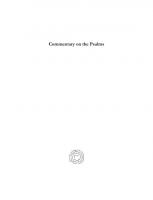Ujjvaladatta's commentary on the Uṇādisūtras [Reprint 2022 ed.] 9783112691328
156 32 18MB
English Pages 300 [304] Year 1860
PREFACE
EINLEITUNG
NOTES
INDICES
GLOSSARY
A LIST
Recommend Papers
![Ujjvaladatta's commentary on the Uṇādisūtras [Reprint 2022 ed.]
9783112691328](https://ebin.pub/img/200x200/ujjvaladattas-commentary-on-the-udistras-reprint-2022nbsped-9783112691328.jpg)
- Author / Uploaded
- Theodor Aufrecht
File loading please wait...
Citation preview
UJJYALADATTA'S
COMMENTARY ON THE UNADISUTRAS.
EDITED FROM A MANUSCRIPT IX THE LIBRARY OF THE EAST INDIA HOUSE
BY
TBEODOR
AUFEECHT.
BONN: A D O L P H
MARCUS.
1859.
TO
H. H. WILSON ESQ., BODEN PROFESSOR OF SANSKRIT IN THE UNIVERSITY OF OXFORD, ETC. ETC. ETC.
THIS VOLUflE IS RESPECTFULLY DEDICATED
BY THE EDITOR.
PREFACE.
T h e Unddisutras the a c k n o w l e d g e d
are
rules
for d e r i v i n g ,
verbal
roots
of the
from
Sanskrit, a
number of appellative n o u n s , by means of a species of s u f f i x e s , w h i c h , though nearly called krits,
allied
to the s o -
are not commonly used for the purposes
of derivation.
T h e y take their name from the suffix
un (that is u w i t h an indicatory n), by w h i c h the w o r d s karu,
vdyu,
pdyu,
jdyu,
mdyu,
are formed in the first sutra. w o r d s derived by an unddi
svddu,
A
sddhu,
peculiarity
dpie,
of
all
is, that, w h e t h e r they be
substantives or adjectives, they do not e x p r e s s a g e neral or indefinite a g e n t ,
but r e c e i v e an individual
signification, not necessarily resulting from the c o m bination of the suffix with a v e r b a l root. like karu from kri, 'to do', or vdyu, meant
only
'doing',
'blowing',
If w o r d s
from vd, c to b l o w ' ,
or 'the
doer',
'the
b l o w e r , there w o u l d h a v e been no necessity for the native grammarians to separate the «modi-words from those formed by the common l a w s of derivation. But the fact that 'the doer', 'the b l o w e r , dividualised
into 'an
sufficiently important
h a v e been
artisan', 'the w i n d ' , to
warrant
the
appeared
collection
such w o r d s as these in a separate treatise.*)
inof
Besides,
*) Karu seems to have been intentionally placed at the beginning of the work, in order to show, by its meanings of 'doing' and 'an artisan', the transition from a hrit to an unadi.
VI
Preface.
w e lind that the ftrtf-suffixes (as for instance a , aka, tri) a r e , in w h o l e classes of verbs, employed for the same purpose, and subject to the same g r a m matical laws. The unddi-suffixes, on the contrary, seem in both respects to baffle the efforts of the grammarian w h o tries to bind them to a definite rule. L a s t l y , it must be confessed that the derivations given of unddi-words are very frequently arbitrary and whimsical. W h o would believe, for instance, that tarku, a spindle', is, by the transposition of the initial and final consonants, derived from krit (kart), 'to break 5 , ndku, 'an a n t - h i l l ' , from nam, 'to bend', amisha, 'flesh', from am, to go', kapila, 'tawny', from kam, 'to love', mayura, 'a peacock', from mi, to hurt' ? Keeping in view these difficulties, it is not surprising that certain grammarians, such as Gargya (Nir. I, 12) and Patanjali, denied the possibility of deriving the unddi-words from verbal roots. In Patanjali s commentary on Panini w e meet repeatedly with the sentence: scni^^spqqrrvT nrfircrf^giTfSr, "the unadis are crude forms without origin"; and another g r a m marian tells u s : saTTsjf?! m \ armf^ craT "the unadiwords are perfect as they a r e " ; thus expressing the opinion that it is impossible to apply to them the same grammatical rules to which w e are accustomed in other words. Another grammatical school, however, ventured to derive all nouns without exception from a verbal root, and proved the possibility of such an u n d e r t a k ing, on the one hand, in the Nirukta, on the other, in the unddisutras. Ydska s a y s : H T i n ^ r n m r i s n i t f H sttcft-
VII
P r e f a c e .
Era^r irpbyqau, "(All) nouns derive their origin from verbs; so says Qdkatdyana, and so agree all commentators (of the Vedas.)" With this sentence w e must combine a kdrikd in Patanjali's commentary on Pdnini
III, 3, 1 :
•TR Pat.
rtt
^
^HsFTT^
3s3PT: I
STOSTÌ
ÓTOKTÌI
^ÌH
I
TO
^f*.









